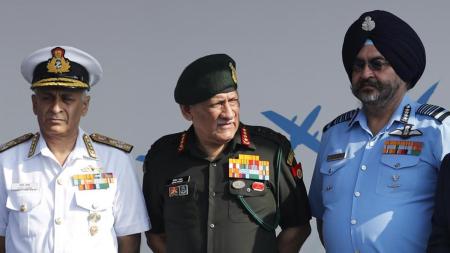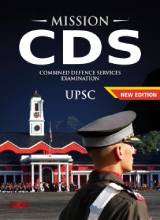India’s War Plans lack synergy without a CDS
THE creation of the post of Chief of Defence Staff (CDS) was among the major recommendations of the Group of Ministers (GoM) headed by then Deputy Prime Minister LK Advani that analysed the report of the Kargil Review Committee. The Cabinet Committee on Security (CCS) headed by then Prime Minister Vajpayee accepted the recommendation of the GoM to appoint a CDS but held its implementation in abeyance. Till today, successive governments have not been able to appoint a CDS.
Three reasons are generally cited for this incomprehensible omission. Firstly, political consensus on the establishment of the post of CDS was lacking. Secondly, the civilian bureaucracy has never been in favour of the concept of CDS. And, thirdly, there has been some opposition even within certain sections of the armed forces to the idea.
The previous Defence Minister, Manohar Parrikar, had said in 2016 that he would ‘soon’ recommend the creation of the post of CDS — which he considered “a must” — to the CCS. He had also said that the Ministry of Defence (MoD) was engaged in working out a mechanism for the post. Over three years later, there has been no further development on appointing a CDS and constituting integrated theatre commands.
It is well known that the operational plans of the armed forces lack synergy. In 1962, the Indian Air Force (IAF) was not given any role to play during the war with China when it could have made a huge contribution to the war effort. In 1965, the Indian Navy (IN) was not even informed about the plans to launch a three-pronged attack across the international boundary (IB) into Pakistan.
It is repeated ad nauseum that the 1971 war was a well-coordinated tri-Service effort that led to a grand victory. The rather limited coordination that was actually achieved during the war with Pakistan in 1971 was mainly due to the personalities of the chiefs in position of authority and not due to any institutionalised arrangements. During the 1971 war, Field Marshal Sam Manekshaw was able to carry his naval and air force colleagues with him due to the personal rapport that he had established with them. Yet, there were several glitches in the planning and conduct of the land and air campaigns and it cannot be stated that India fought a coordinated “air-land” war.
The Indian intervention in Sri Lanka was undoubtedly a disaster from the joint planning point of view. The Kargil conflict of 1999 is the only real example of a coordinated tri-Service effort. Even here there were initial hiccups and it took the IAF several weeks to begin bombing the Pakistani intruders’ sangars (ad hoc bunkers) on the Indian side of the LoC after the army had made such a request.
India’s prevailing security environment is marked by regional instability with a nuclear overhang. More than ever before, it is now necessary for the national security decision-makers to be given “single-point military advice” that takes into account the operational strengths and weaknesses and the inter-dependence of each of the armed forces on the other to meet complex emerging challenges in a nuclear environment. Such advice can come only from a CDS.
Besides giving such advice to the CCS, the CDS will streamline the operational readiness and employment of India’s nuclear forces. While India’s nuclear doctrine and policy are guided by the National Security Council and the CCS, their execution is entrusted to the Services and here a joint approach is mandatory. The Strategic Forces Command (SFC), constituted for the planning, raising and equipping and the command and control of India’s nuclear weapons, will function directly under the CDS even while functional control over the nuclear warheads and the delivery systems comprising the “triad” remains with the civilian political leadership.
The CDS will also have several other responsibilities. Aerospace, information warfare, cyber-security and issues like the management of the electro-magnetic spectrum, including frequency management, electro-magnetic compatibility (EMC), electro-magnetic interference (EMI), electronic emission policy (EEP) and the offensive employment of non-communications devices such as radars for electronic warfare, will all be legitimately the domain of the CDS and HQ IDS.As and when tri-Service Space, Cyber and Special Forces Commands are raised to meet emerging challenges in these fields and to better manage all available resources, they will function directly under the CDS. A tri-Service Logistics and Maintenance command has also been long overdue.
On the non-operational side, training institutions such as the National Defence College, the College of Defence Management and the National Defence Academy and organisations like the Armed Forces Medical Services, Canteen Stores Department and a host of others will be placed under the direct command of the CDS for better synergy in their functioning and optimum exploitation of their potential.
The present Chiefs of Staff will still have a major role to play when there is a CDS. The three Chiefs will oversee the development and acquisition of weapons and equipment for their service, plan recruitment, guide and coordinate training at specialised training establishments and control administrative matters such as the annual budget, pay and allowances, maintenance support and medical services etc.
All other major democracies have opted for the CDS system. Most countries with large armed forces, including China, have established theatre commands. India cannot ignore these concepts any further except at great operational risk. These are ideas whose time has come. International experience shows that such reform has to be imposed from the top down and can never work if the government keeps waiting for it to come about from the bottom up.
Also Read:
Sri Lanka Informally ‘Reaches Out’ For NSG Help
Eastern Army commander visits forward areas along LAC in Arunachal Pradesh
Pakistan’s DG ISPR Admits Initial Claim Of ” Two Indian Pilots ” In Custody Was Error On His Part
Source: DefenceNews






 Order Now on Amazon
Order Now on Amazon
